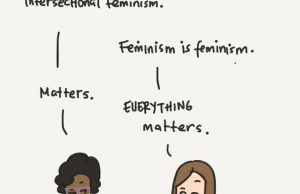COLLEGE FEMINISMS: Lily Allen Peddles the Same Racist Tropes Through White Privilege Narrative
By Mohadesa Najumi

Lily Allen’s “Hard Out Here” video has not been circulating the Internet unscathed. If you haven’t seen it, it is a largely satirical piece that attempts to scorn the denigration of women in popular culture through depicting a parody of the hyper-sexualised industry. Many critics have voiced their issues with her seemingly “feminist” pop song; however I feel I need to weigh in on the Allen spectacle and provide my insights on her repudiating and frankly, nauseating racism and subsequent denial of it.
First and foremost, I would like to point out that I am all FOR Allen’s necessary illumination of prevalent societal 1) slut-shaming 2) male and female double-standards of beauty 3) her obvious jab at Blurred Lines and T.I’s deplorable ass-tearing comment and her general overarching message that women exist for substantially more than just male pleasure. Objectification is certainly an effective tool for trivialisation and minimisation, and in this sense Allen’s axioms are apposite and welcome. I am also a fan of her earlier work whereby she challenged patriarchal societal norms by speaking openly about female sexual desires in songs such as “Not Fair” and her public declaration of body dysmorphic disorder certainly opened some doors for discussion about the repressing nature of body image in the industry.
However, Allen’s peddling of racist tropes and subsequent denial of it when confronted by critics is neither welcome nor acceptable. Her “Hard Out Here” video is designed as a satire that depicts the farcical nature of the popular culture. Indeed, this culture is constantly belittling women and Allen sought out to reverse this, in theory. Unfortunately, the only farcical aspect of her ostensibly empowering video was her patholigization of black women and abundant racist motifs.

Satire that sees the perpetuation of racism, sexism or homophobia is just another tool for oppression and we see this in the case of Allen’s parody. As Black In Asia points out:
“‘Ironic racism is still racist”
Batty Mamzelle also highlights:
“It is possible to call out oppression without participating in that same oppression”
Indeed, just as Miley Cyrus did during her infamous VMA performance, Allen reduces the existence of her predominantly black cast to a spectacle of twerking, hyper-sexualisation and all round minstrel-ness. Her black dancers are used as obvious background props and seen to be participating in sexual acts with champagne bottles. In one instance, we see the torso of one of the black dancers (clutching on her vagina) before we even see her face. This further pushes ideas that sexuality is part and parcel of black womanhood.
Allen mimics the Miley trajectory of slapping the ass of one of the black dancers, reducing here existence to a mere sexual plaything. The black dancers are mostly in bikinis and leotards, while the white and Asian performers are wearing jackets covering more of their body than the black women. Allen also roams off during the end of the video leaving the semi-nude dancers behind on set. This signals some kind of unequal power relation and hierarchy, as Allen is able to leave the hyper-sexualised milieu she just finished depicting, while the mostly black women remain behind. Her positioning throughout the video is also worrisome, as she stands tall above the gyrating black women whom remain on floor level. Again, the hierarchy of white privilege is apparent.
All of these actions feed into the already existing patholigization of black female sexualities that are treated as lewd, lascivious, and uncontrollably sexualized.
My central angst is surrounding the archetypical nature in which Allen replied to critics. She played the old “it’s not about race” card instead of actually addressing the wholly legitimate claims made against the caricaturing in her video. Nowhere did she say she was willing to listen, or even consider the voice of black women who she claims to speak for in her homogenising brand of pop feminism.
Allen chose to universalise complex women’s struggles. She chose to brush aside evidence of centuries of black female oppression and minimise her actions. She chose to neglect her responsibility of intersectionality and excluded entire groups of women through her actions. Is this feminism? No. Allen chose whom she wants to be a part of her struggle, and the rest of us can just go to hell.
Long has the white liberal feminist narrative omitted the issues and voices of black women, and of WoC in general, denying the anomaly of our oppression, placing gender issues above race issues and painting all women’s issues as “the same struggle”. The powerful “Solidarity Is For White Women” twitter hashtag is the best contemporary exemplification of this polarization and has brought to the forefront the experiences of women of color who feel alienated and excluded from this brand of white feminism.
Yes, there exists a hierarchy of oppression, and women like Allen and Cyrus fall at the top of it. For Allen, “There’s a glass ceiling to break.. there’s money to make” and for black women, there are a myriad of issues that don’t primarily involve slut-shaming, work-place inequalities and objectification. That’s not to say that the aforementioned issues are not of immediate importance, but black women face a heightened version of oppression. This is fact. No negotiation. Black women face constant discrimination in seeking work. African American women for example are three times more likely than white women to be incarcerated. The list goes on.
In order to save herself from the guilt and shame she should really be feeling for feeding into the recurrent, racist tropes of black women practiced by her “hero” Miley, Allen chose to absolve herself of the obviously complex responsibility she took on when she decided to package women’s issues into a pop song. I want no part in Allen’s feminism. My feminism is intersectional and includes non-cis, trans, homosexual, queer and non-abled folk. Allen’s message to black women across the world is clear: I will appropriate and undermine your struggle, and I will not apologise for it.
____________________________________________
 Mohadesa Najumi is a writer, politics enthusiast and intersectional feminist living and studying in London, England. Contact her on [email protected] and follow her blog here.
Mohadesa Najumi is a writer, politics enthusiast and intersectional feminist living and studying in London, England. Contact her on [email protected] and follow her blog here.




Pingback: Lily Allen Peddles the Same Racist Tropes Through White Privilege Narrative
Pingback: Lilly Allen Peddles The Same Racist Tropes Through White Privilege Narrative | Mohadesa Najumi
Pingback: Lily Allen Peddles the Same Racist Tropes Through White Privilege Narrative | JESUS FUCKING CHRIST.
Pingback: The Big Idea | Pop Feminism
Pingback: The Fear | FeministsSA.com
Pingback: #MoñasRecomendaciónMusical : ‘Hard out here’ de Lily Allen | Hay una lesbiana en mi sopa
Pingback: Lily Allen Peddles the Same Racist Tropes Through White Privilege Narrative | JESUS FUCKING CHRIST.